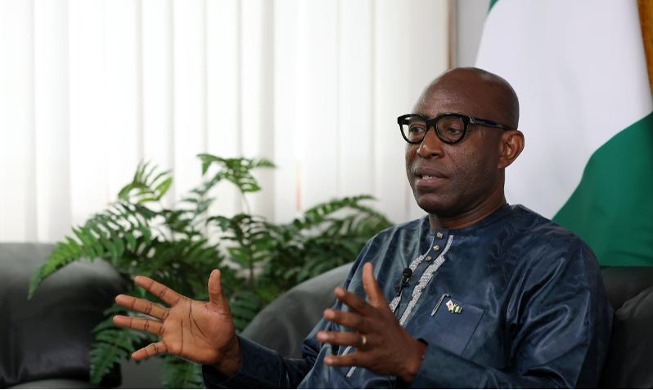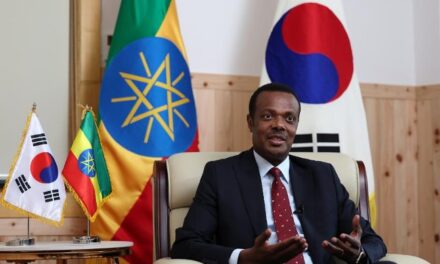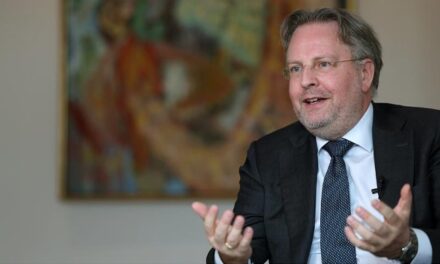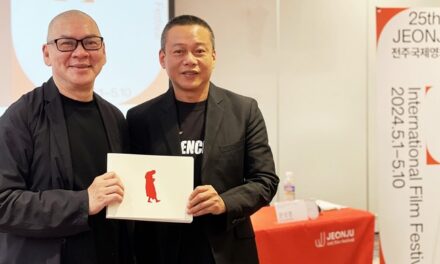Ferdinand O. Nwonye, charge d’affaires a.i. at the Nigerian Embassy in Seoul, on April 26 calls the Korea-Africa Summit a “win-win” for all in an interview with Korea.net at his embassy in Seoul’s Yongsan-gu District.
By Sojung Yoon
Photos: Jeon Han
Video: Jeon Han, Lee Jun Young and Park Daejin
“Distance doesn’t matter,” says Ferdinand O. Nwonye, charge d’affaires a.i. of the Nigerian Embassy in Seoul, on the secret behind the close ties between Korea and Nigeria.
In an interview with Korea.net, Nwonye said both sides cooperated long before they forged official ties in 1980 and that their relations have since seen robust and dynamic development. He added that Nigeria is the leading country of Africa and its largest market and was the first on the continent to get a Korean Culture Center.
On the inaugural Korea-Africa Summit from June 4-5 in Seoul, the diplomat called the event a “win-win” for all. He said he hopes this gathering between Korea and African countries will offer opportunities for both sides to deepen cooperation in all sectors.
The following are excerpts from the April 26 interview with the official at his embassy in Seoul.
President Yoon Suk Yeol in September last year held summit talks with Nigerian President Bola Tinubu, following the 2022 visit to Korea by the latter’s predecessor Muhammadu Buhari. What are both nations close despite their physical distance?
I believe distance does not matter. The two countries worked before their diplomatic relationship was forged in 1980. Since the establishment of ties, both sides have developed a very vibrant and robust relationship. Nigeria is a strong African partner for Korea. Both countries have held meetings of the Korea-Nigeria Joint Commission, with the sixth held in Seoul in 2021 to widen cooperation in all areas including economy and military. The seventh will open in Nigeria later this year.
In 2022, when the World Bio Summit was held in Seoul, then President Muhammadu Buhari was the only head of state to visit Korea for the gathering, which shows the significance of bilateral ties. Nigeria is the leader of the African continent and its largest market, where Korean companies such as Samsung, LG and Daewoo have a big presence.
What projects are both countries jointly working on in Nigeria?
Both sides are actively working together especially in oil and gas. Daewoo Engineering & Construction is working on an oil and gas development project in Nigeria. DH Hyundai Mipo also recently received an order for a liquefied petroleum gas carrier worth over USD 500 million from a Nigerian firm.
Culture is another unmissable area for cooperation. We need to take a closer look at how Nigeria is the first African country to get a Korean Cultural Center on the continent, which has more than 50 countries. The KCC in Nigeria has actively conducted projects in culture and tourism. This is the most active among Korean organizations operating in Nigeria.
From June 4-5, Seoul will host the inaugural Korea-Africa Summit, the first multilateral event between Korea and countries on the continent. What areas of bilateral cooperation does Nigeria expect to promote at this gathering?
The Korea-Africa Summit is a win-win event in short and we wish for both countries to bolster cooperation in all areas thanks to the upcoming gathering. This year, Nigeria is the chair country of the the Economic Community of West African States (ECOWAS), so our president will attend the summit to represent Nigeria and ECOWAS as well.
In areas of cooperation, defense is one area that we’re working very well together and wish to deepen further. Earlier in April this year, the Republic of Korea Navy donated a patrol vessel to the Nigerian navy and a handover ceremony was held on the naval base in (Jinhae-gu of Changwon, Gyeongsangnam-do Province).
Another area we wish to advance is agriculture. Sesame seeds and beans are some of the largest export items of Nigeria. The two nations will discuss and sign a trade agreement at the upcoming seventh meeting of our joint commission. When the deal is signed, Nigeria can export a lot of agricultural products to Korea.
In September last year, the Korean Institute of Geosciences and Mineral Resources also signed a memorandum of understanding with the Nigeria Geological Survey Agency on cooperation projects. Also, we wish to strengthen cooperation in education, information, technology and communications.
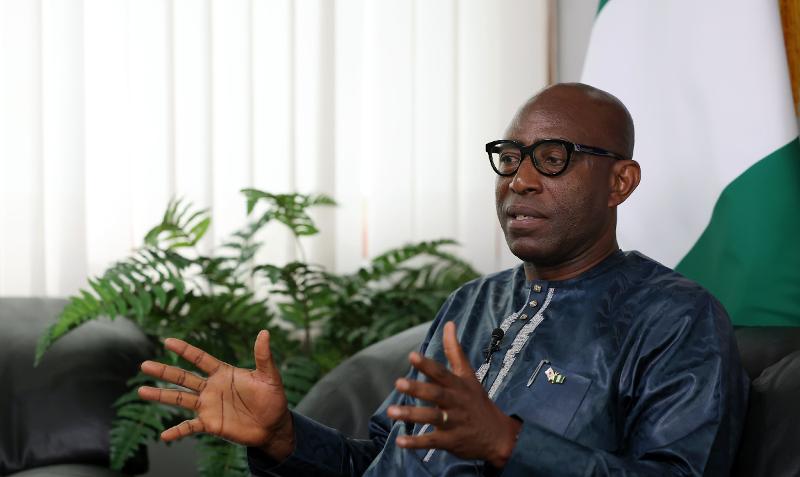
Ferdinand O. Nwonye, charge d’affaires a.i. of the Nigerian Embassy in Seoul, on April 26 stresses how Nigeria is the first country on the African continent to get a Korean Cultural Center and that bilateral cooperation can get a big boost in all sectors from the upcoming Korea-Africa Summit.
How does Abuja see Seoul’s efforts to secure peace on the Korean Peninsula?
I see tension on the Korean Peninsula but it can be found in other parts of the world, too. I believe Korea’s diplomacy and the collective efforts of the United Nations can help all involved parties gather at the negotiation table for peace talks. Nigeria has participated in U.N. peacekeeping missions and will always carry out its role to protect peace. Korea has worked for the U.N. Security Council as a non-permanent member. I believe Korea can make all efforts to secure peace on the peninsula while serving its role. For us, peace on the peninsula is also very important.
What specific aspects of Nigerian culture, food or tourism do you recommend?
Nigerians are passionate about food, fashion, movies and music. Recently in Lagos, a large-scale K-pop festival was hosted by the KCC in Nigeria. The Itaewon neighborhood of Seoul has three Nigerian restaurants. Nigeria has the world’s third-largest film industry after the U.S. and India dubbed “Nollywood.” My country is a tourism attraction. Lagos, its biggest city and center of finance and culture, is also the largest city in Africa. It’s as big as New York and has a lot to offer.
Nigeria has no winter but rainy and dry seasons. If you plan to visit, the dry season from late July to April is the best time. We also have many fun festivals such as the Durbar Festival (August and September), Calabar Carnival (December) and Argungu Fishing Festival (February), so please note this if you plan to travel. You can have fun for a fourth of the budget you would need for a trip in Korea. Nigerians are kind and more than half of them are youth. So the people are young and resilient.
What similarities and differences do you find in Korean and Nigerian culture?
I can see similarities in food and music. Like Koreans who achieved economic development through diligence, Nigerians are also industrious and hardworking, so that is another similarity. Many Nigerians are also married to Koreans and settle in Korea.
What do you like best about life in Korea?
I like the peaceful mood here, as in I can go anywhere I want at any time. People are kind and Korean food like kimchi or bibimbap (mixed rice with vegetables and meat) are similar to Nigerian cuisine, so I like the food here. I’ve visited many tourist attractions in places like Busan and Jeju Island and my favorite is N Namsan Tower. I also like the scenic view of (Jinhae-gu of Changwon, Gyeongsangnam-do Province) with cherry blossoms.
Twenty-nine Korea.net Honorary Reporters are from Nigeria. What concluding message do you have for our readers worldwide?
I support (Honorary Reporters’) activities. Recently, the Daily Times of Nigeria and the Korea Herald signed an MOU on cooperation. Nigeria is a dynamic country and like Korea, we are a constitutional democracy based on rule of law and human rights. Since 1980, we’ve fought for democracy and hold elections every four years. If both countries work together, we can also do a lot for democracy. Nigeria offers a lot, so I hope we can work together and grab such opportunities.
arete@korea.kr

